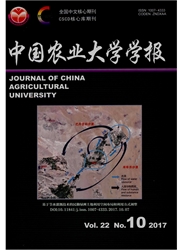

 中文摘要:
中文摘要:
为了解不同规模养殖户对畜禽污染治理政策的接受意愿,基于全国5省754个生猪养殖户的实地调查数据,运用选择试验方法实证检验了不同规模养殖户对技术培训、排污费、技术标准、沼气补贴和粪肥交易市场5项畜禽污染治理政策的接受意愿。研究结果表明,不同规模养殖户对畜禽污染治理政策的接受意愿具有异质性。小规模养殖户对沼气补贴政策的接受意愿最高,其次为全面技术培训和一般技术培训政策,对技术标准政策的接受意愿最低;中规模养殖户对沼气补贴政策的接受意愿最高,其次为粪肥交易市场和全面技术培训政策,对排污费政策的接受意愿最低;大规模养殖户对粪肥交易市场政策的接受意愿最高,其次为沼气补贴和技术标准政策,对一般技术培训政策的接受意愿最低。畜禽污染治理政策对不同规模养殖户的激励程度不同。中规模养殖户在各项政策下畜禽污染处理率的提高比例均较高,小规模养殖户在各项政策下畜禽污染处理率的提高比例均较低。
 英文摘要:
英文摘要:
Using the survey data of 754 pig breeders in China,choice experiment method was employed to investigate the willingness of different pig farm scale farmers to accept livestock pollution control policy.Establishment of livestock pollution control policies considered many features including technology regulation,pollution fee,biogas subsidy,manure market and technical training.The results showed that there is considerable heterogeneity in farmers' willingness of three different farm scales to accept livestock pollution control policy.Household-scale farmers showed the highest willingness for biogas subsidy,followed by high technical training and medium technical training,and their willingness for technical regulation was the lowest.Medium-scale farmers showed the highest willingness for biogas subsidy,followed by manure market and high technical training,and their willingness for pollution feewas the lowest.Large-scale farmers showed the highest willingness for manure market,followed by biogas subsidy and technical regulation,and their willingness for medium technical training was the lowest.In conclusion,the impacts of livestock pollution control policy on farmers with different farm scales were different.The increment of manure handling rate was lowest in household-scale farmers under various policies,while it was highest in medium-scale farmers.
 同期刊论文项目
同期刊论文项目
 同项目期刊论文
同项目期刊论文
 期刊信息
期刊信息
